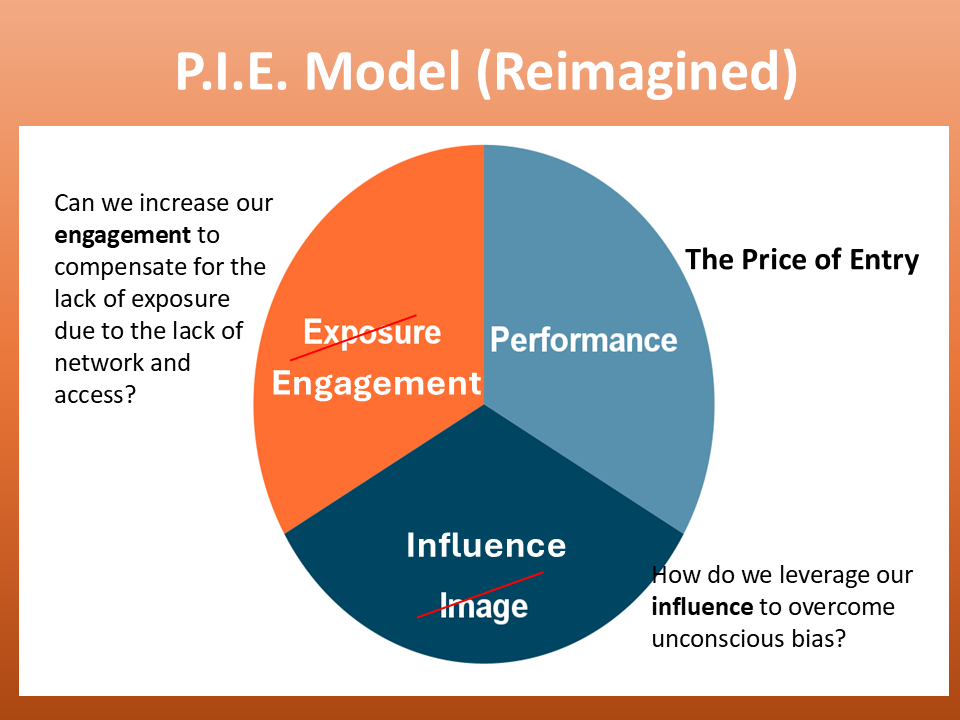Why Hard Work Alone Won’t Get You There
Hard work alone won’t get you ahead. I learned this the hard way when I lost a promotion – not because I was not qualified, but because the right people did not know who I was.
Unlike most fresh-out-of-college hires, I entered the corporate world at the age of 32 after being an entrepreneur as a restaurant owner. Someone introduced me to Harvey Coleman’s PIE model early in my corporate career. Curious, I looked it up and was surprised by what I found.
According to Coleman, career success isn’t just about performance. It is about Performance – 10% (Yes, only 10%!), Image – 30%, and Exposure – 60%.
The message? Doing great work wasn’t enough – you had to be seen and heard. I found this fascinating but also frustrating. In my restaurant days, performance was everything. If the food were terrible, customers would not return. If service was poor, word spread fast. But in the corporate world, I quickly realized that working hard in silence wouldn’t get me ahead.
I learned this lesson the hard way when I found out I missed a promotion simply because the decision-maker had never heard of me. That moment reshaped my perspective on career growth; it’s not just about merit but also advocacy.
The New PIE: Performance, Influence, and Engagement
Fast forward 20 years, and the workplace has evolved. With LinkedIn, remote work, and job-hopping, the traditional PIE model needs an update. Careers aren’t as linear, and “image” feels outdated in a world that values authenticity over polished façades. If it didn’t, I, a 5’3” Asian woman, wouldn’t stand a chance against the corporate stereotype image of the tall, white male executive.
The fundamentals of success remain the same: you need to do great work, be seen, and build relationships. But instead of Image and Exposure, let’s focus on Influence and Engagement—two more important elements today.
1. Performance: The Foundation, But Not the Whole Pie
Yes, doing great work still matters. It’s the baseline requirement for success. If you don’t perform, no amount of networking or branding will save you. But here’s the reality: performance alone won’t get you promoted. A mentor once told me, “You have to stop expecting your work to speak for itself. It doesn’t have vocal cords.”
If performance alone were enough, every top performer would be a leader, but we know that’s not the case. That’s why Influence and Engagement matter just as much.
2. Influence: Expanding Your Reach Beyond Your Work
Influence isn’t about office politics or self-promotion. It’s about being a trusted voice in decisions that matter. People should turn to you for advice, ideas, and insights. How do you build influence?
- Speak up in meetings. Not just to talk but to contribute valuable perspectives.
- Advocate for ideas, not just tasks. If you’re always executing, you’ll be seen as a doer, not a leader.
- Mentor and uplift others. Influence grows when you help others succeed.
I frequently work with clients who are exceptional at their jobs but rarely voice their opinions in leadership meetings. Their influence and career opportunities tend to grow once they start advocating for ideas rather than just executing tasks.
Ask yourself: Who listens when you speak? Are you part of key conversations or just an observer?
3. Engagement: Being Visible, Present, and Connected
This is where real opportunities emerge. Engagement means actively participating in the culture, networks, and conversations that shape your company and industry.
What does engagement look like?
- Building relationships. Promotions and job offers often go to people who are known and trusted. Sad, but true.
- Getting involved beyond your role. Join employee resource groups, seek out and volunteer in innovation projects, consider lateral assignments that help you build influence, and learn new knowledge.
- Showing up with energy and curiosity. Leaders notice those who bring positive energy to the table.
You’re limiting your growth opportunities if you only engage when it directly relates to your job description. I often took on special projects outside my core roles without expecting immediate rewards, driven by my curiosity and quest for new knowledge. Through those experiences, I built valuable relationships with senior leaders and unique experiences that later opened doors for me externally. That’s the true power of engagement.
Ask yourself: Are you known beyond your immediate team? Would your name come up if promotions or major projects were being discussed?

Why This Matters More Than Ever
This reimagined PIE framework isn’t just for individuals. It’s a powerful tool for leadership development. Organizations that foster Performance, Influence, and Engagement create leaders who drive results and inspire action. Career advancement isn’t just about doing the work – it’s about shaping the conversations, relationships, and opportunities around you.
If I could go back and talk to my younger self, the one staring at that PowerPoint slide about the original PIE model, I’d say this:
“Yes, your work matters. But so does your ability to shape the world around you. Influence and engagement aren’t just career accelerators; they’re leadership essentials. Make your work known, and engage with the people who can help shape your future. Our companies may own our jobs; we own our careers.”
Now, I leave you with a question: Which slice of PIE are you missing?
The views and opinions expressed in this content are my own and do not necessarily reflect the views or positions of any organization I am affiliated with.